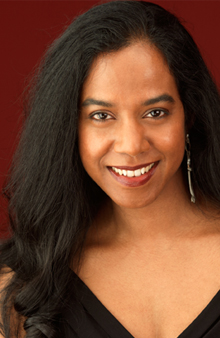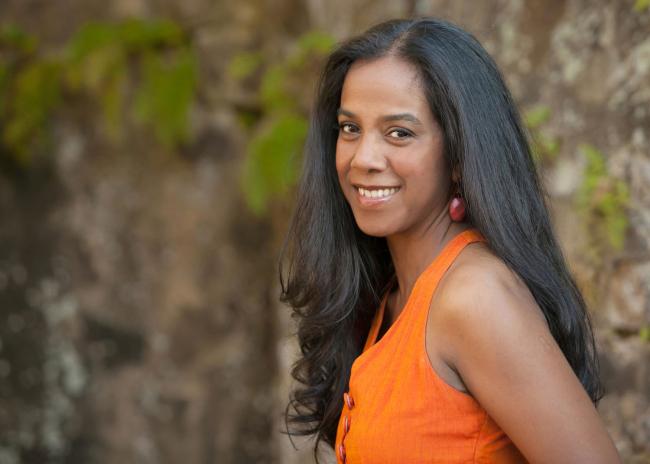
What Is Feminism? by Ru Freeman

Editor’s note: The following post is part of a series in which a diverse range of women writers discuss their definition, idea, or experience of feminism. For more background, take a look at our Fall 2012 issue, which features “Bad Feminist” by Roxane Gay. You can find other pieces in this series by clicking here.
———
My idea of feminism is defined primarily by the country in which I was raised, Sri Lanka, one which accords all but immortal power to women and demands everything it is possible to give to a community, to family, to life, in return. It is a duality that often confuses the visitor, but is clear as daylight to natives.
Our pop songs speak of the gift of daughters, of how a home with a dozen sons remains dark without the light that is brought to it by a daughter. In the long-ago tradition of our matriarchal society, women owned property, not men, and I enjoyed learning of the practice whereby a man would work on a woman’s land for a season, and if she liked him she could choose to keep him.
Girls have equal access to our system of free education from grade one through university, and are heavily represented at all levels of government and in the private sector. Female head of state? I grew up with one, the first in the world. I do not know if she could make a mean coconut sambol; her cooking skills were never in question, never a banner headline in any newspaper before, during, or after her period of public service. As a nation we called her Mother, but what kind of a mother she was to her own children, we did not know, nor did we ask. Suffice to say that both her son and her daughter rose to political power, her daughter, for better or worse, to become the first president of Sri Lanka.
Within that larger context I also learned to love femininity, to value the long hair and hip-sway-head-held-straight walk of the women around me. I admired and emulated the homemade potions and remedies that produced smooth skin and soft lips, and though I never learned to sew, I developed a keen appreciation for the grace of colorful textures and impeccably cut clothes, as well as the elegance of high-heeled shoes. I absorbed, from my mother, the sensory pleasure of holding jewelry in my palms, feeling the weight of pendants and earrings passed down through generations, the delight of glittery necklaces held up to my neck, bought for a song from traveling sales women.
With each act, with each such moment, I learned to transform myself into a tangible presence of beauty, the kind that might, one day, walk into any room and be able to attract the adoration of not only men but, more importantly, women. It stood to reason that this dressing up, this preening, learned, built, and measured in the presence of women, would bring with it a deep love for women, even as it attracted the attention of men.
How hard it was then to discover, as a newly arrived freshman in college, that America had a different set of rules for women, ones which forced a choice upon me that I did not wish to make. In my undergraduate classes I struggled to make sense of texts which placed men in opposition to women, while in the social sphere women were placed in constant competition with other women. Why did my highly paid professor of economics at my highly competitive liberal arts college speak with such disdain to the women in his class? Why were girls who dressed well referred to in such derogatory terms? I grew older here, in this country, learning to refer to Title IX and nod wisely when my activist friends condemned other women as identifying with the male world view.
I called on my Sri Lankan interiority to win the things I needed—money, power, discretion—to do my job, from American men who enjoyed calling me honey and babe, terms that never threatened my sense of self, my confidence, or my stature among them. And I projected the American-me that I knew was called for with men who treated me as a human being only, my femininity out of sight.
We are accustomed, in this other country of my dual-citizenship, to bemoaning the lack of freedom in faraway places—in Jane Smiley’s post on this same blog, even, when she talks about the problems faced in “many cultures” where solidarity trumps individual will, unlike here where personal interpretation of feminism is a triumph for individualism. I see an abyss in such a reading of our common world, one where we are each poised to free-fall, alone, into a sharp edged pit of joylessness. I, too, envision a world where women—and men—are spared the horror of rage, violence and condemnation, particularly within the intimate setting of home, but I understand that this is the reality for many women and men in this vast land where we genuflect before the altar of individuation, as it is in my country of birth, where our first resort and our last is always communal. Our successes, my American sisters and mine, are better for the fact that they complement each other. It has been said before, but it merits being said again: We rise and we fall together, and a deeper appreciation for the ways in which we navigate our common world is something I value far more than any notion that one or the other of us is privvy to the “right” way to celebrate the multitudinous blessings of our gender.
As I reflect upon one of the cornerstones of my own activism—how the world beholds and what the world holds for girls and women—I am conscious most of all of the example I set for my own three daughters, the oldest of whom stands poised on the brink of setting off to make mistakes and celebrate triumphs of her own. A straight-A student and an athlete with medals adorning all the corners of her room, she will be the beneficiary of the hard work of American feminists who will ensure that she will learn in classrooms but also run and swim at a college of her choice. She and her sisters are also the beneficiaries of Sri Lankan women who have taught them to inhabit any space—outdoors or within buildings, public or private—as though it were built specially for them, nothing denied them, nothing to diminish their worth; their worth which includes the beauty that comes from a way of being among and with other women, an inner self-definition that has nothing to do with political ideologies.
———
About the author: Ru Freeman’s creative and political writing has appeared internationally. She is the author of the novel A Disobedient Girl, which was translated into several languages. She blogs for the Huffington Post on literature and politics, is a contributing editorial board member of the Asian American Literary Review, and has been a fellow of the Bread Loaf Writers’ Conference, Yaddo and the Virginia Center for the Creative Arts. Her new novel, On Sal Mal Lane, will be published by Graywolf Press in May 2013. Read her short story in VQR from the Winter 2012 issue.

